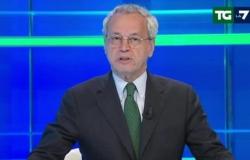Numbers and the domino effect, from Puglia to Brussels and passing through Rome: in the end it is and will all be there, already beyond words and beyond one election campaign without sharp notes, but which at least limited the poisons to the bare minimum (if there was ever a necessary minimum dose of poisons) and tried with some difficulty to stay on the merits of the issues. Tomorrow evening, at the closing of the seats and at the start of the counting of the European elections, the first scenarios will materialize, in the round and then strengthened the following day by the municipal verdict. With a view already on future challenges, read the entry on Apulian regional elections.
First of all, the balance of power between parties, in government and in opposition: subtle balances and complex alchemies after the “all against all” electoral race, without coalitions and with a tendency to characterize and polarize the proposal, and scars and frayed relationships will inevitably remain to be mended quickly, in the center and on the periphery. Giorgia Meloni, prime minister and leader of the Brothers of Italy, has already raised the bar: «The vote is a referendum between two visions of Europe, it is the Champions League after winning the scudetto (i.e. the Policies in 2022, ed.) ». Strong metaphors, but applicable across the entire political spectrum.
The other level of analysis, hierarchically superior and yet not exactly immediate in the perception of the electorate, will concern the hard core of the vote: the repercussions on the EU and the new lines of demarcation of the European structures. Anti-Europeanism in the strict sense is no longer very fashionable, also because in the meantime the EU has had to counteract crises (pandemic, war, energy supply) and provide answers (the Next generation EU, for example): Euroscepticism has gave way to the widespread ambition of a different, even more integrated and protagonist Europe.
Then there is the third level of reflection, and it is the strictly Apulian one and which crosses the other half of the two electoral days, therefore the municipal elections of Bari and Lecce: in the magmatic Puglia, grappling with a change of political era, what it will happen? How will the combined action of the European and Administrative bodies reshape the framework and impact regional leadership and future strategies?
The centre-right
The center-right has found reasons for unity, which is not at all a given in Puglia, certainly aided by the best glue there is: the government and the long wave of melonism. For the European elections, despite the national frictions FdI-Lega and Salvini-Forza Italia, no low blows between Apulian candidates or regional leaders. However, there are hidden tactics, encouraged by the preferential vote: FdI aims to strengthen its leading role in the centre-right, Forza Italia wants to consolidate the progressive rise and the League must close ranks, containing the inevitable decline in Puglia and the south compared to the national average and the previous percentages. Detachments and proportions between parties will contribute to assigning primacy on the moves for 2025, the (crucial and potentially “year zero”) year of the Regionals. In short: whoever emerges strengthened and legitimized will deal the cards. Not only that: in Fratelli d’Italia, keep an eye on the performances of the regional councilors Francesco Ventola and Michele Picaro, they will be the unit of measurement of the internal chemistry of the party, the first supported by the “safe” minister (European Affairs, Pnrr, South) Raffaele Fitto , the second by Marcello Gemmato, regional coordinator of FdI and undersecretary of Health. Two souls of FdI competing for the golden share on everything, even on the next nominations. On a side note: the Salento minister is among the names from which Meloni will draw to indicate a potential European commissioner. At the municipal elections the “miracle” of the compact centre-right took place, at least apparently: the young Northern League member Fabio Romito in Bari, the expert Adriana Poli Bortone in Lecce, the big names occasionally escorting both candidates in the various initiatives, even wanting to plastically demonstrate the sense of loyalty and closeness of leaders and great players. Then, and we always return there, it will be up to the numbers: the objective is the run-off, starting with the opposition’s handicap of 20 years in Bari and seven in Lecce, victory would be the best cement to keep everyone together, defeat – as always – would lift the veil and reawaken old fractures, showdowns and sudden changes in methods and protagonists for 2025.
The centre-left
The center-left walks on the edge of a contradiction. On the one hand the system of consensus and power that has resisted for twenty years and remains widespread, on the other hand the tangible sensation of the change of phase, or even of the end of an era, amplified by the short circuit of the well-known Bari political-political events judicial. Events fortunately remained on the margins of the electoral campaign, except for a few isolated “fires”, but always ready to erupt again. Here too, the spotlight is on the bars and elasticity of consensus, especially for the Pd and M5s: the head-to-head between the two parties, who have not spared any jabs, will mark the future steps. At stake is the life cycle of the always random wide field dem-pentastellati, paused for the European Championships, strengthened in Lecce and set aside (for now, then we’ll see in the run-off) in Bari. An Apulian record for the M5s at the European Championships it would definitively induce Giuseppe Conte to take the big step: banging his fist on the table and demanding the nomination of the unitary gubernatorial candidate for 2025. Perhaps playing with not entirely unsuspected sides in the Democratic Party, in the Michele Emiliano area and surrounding areas. First of all, the former prime minister – who presided over Puglia far and wide – will have to decide whether and how to bring the five stars back into the regional council, after the thunderous “rip in half” in the scorching weeks of the judicial scandals. But the chess game is just beginning. The Democratic Party will be dragged to the European elections by Antonio Decaro, outgoing mayor of Bari and already in the running for the podium of the most supported in the whole of Southern Italy. The Anci president would be the natural candidate for the Region, but the variables are starting to multiply and giving up Brussels is not such a linear path. In the meantime, however, Decaro has already mobilized the network of administrators, choosing a very local campaign, piece by piece, and almost with the lights off: it will come in handy. Emiliano, for his part, observes from the sidelines: yes support for the “flagship” candidates (assuming there is a flag), but presence at historic lows on stages and public events, the governor still wants to remain the king maker also on the next tables of game. The municipal elections are a key test for the centre-left and Elly Schlein, for example, knows this very well, as she has placed many chips in Bari (and Florence): the landslide and landslide in the Apulian capital and in Lecce would be much more than a dangerous clue, but in fact an earthquake. Which would accelerate the break with these last twenty years of consensus and power, and would accentuate the need for discontinuity and a change of pattern and faces.
© ALL RIGHTS RESERVED
Read the full article at
Puglia Newspaper






